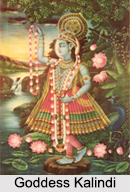 Kalindi is also known as the Goddess Yamuna. Goddess Ganga and Yamuna are said to be twins; their rivers running parallel. Goddess Yamuna is mentioned in the Rig Veda, the Atharva Veda and Brahmanas. It is said that she came down from the heavens to sanctify Mother Earth. From the heavens she rested on Kalinda Mountain in the Himalayas, hence she is also known as "Kalindi". A dip in her holy waters annihilates fear of death.
Kalindi is also known as the Goddess Yamuna. Goddess Ganga and Yamuna are said to be twins; their rivers running parallel. Goddess Yamuna is mentioned in the Rig Veda, the Atharva Veda and Brahmanas. It is said that she came down from the heavens to sanctify Mother Earth. From the heavens she rested on Kalinda Mountain in the Himalayas, hence she is also known as "Kalindi". A dip in her holy waters annihilates fear of death.
Iconography of Goddess Kalindi
The lotus flowers that grow in her waters are the eyes with which Kalindi or Yamuna gazes at Lord Krishna. Her vortexes are the ears with which she hears about Krishna. Kalindi"s fish are the nose with which she smells the fragrance of Lord Krishna. Her waves are the arms with which she embraces Krishna. Again Kalindi"s swans and cranes are the mouth with which she glorifies the Lord. Her waters are the servant with which she worships Lord Krishna.
Legend of Goddess Kalindi
According to legend, Yamuna was a great favourite of her father Lord Surya. After the children, Yama and Yamuna were born, Sanjna left her sister Chaaya in her place pretending to be her, and returned to her parents" home, as she could not bear the Sun"s intense brightness. Once, Chaaya was not very compassionate towards Sanjna"s children. Yama, unable to tolerate Chaaya"s cruelty any longer, stamped her foot hard. Enraged by this, Chaaya cursed Yama that he would lose his foot. Yamuna his beloved sister could not bear this injustice. She came to Earth and prayed for the curse to be revoked. Yamuna was devastated and she kept weeping. It is said her tears became the River Yamuna. It is believed that anyone dipping in the Yamuna is spared a painful death.
In memory of this profound love between brother and sister, "Bhai Dooj" is celebrated in various parts of the country. Sisters pray for their brothers to have a long life and brothers vow to look after and protect their sisters.
Kalindi and Lord Krishna
River Yamuna is next only to the River Ganga in her sacredness. According to the legends, Vasudeva was crossing the Yamuna while carrying baby Krishna. He was seeking a safe place at Gokul on the other bank from Mathura. It was then that Krishna fell into the river. The dust of his lotus feet is said to have sanctified Yamuna. Since this blissful touch of the Lord"s feet, Yamuna claims to be holier than the Ganges River.




















